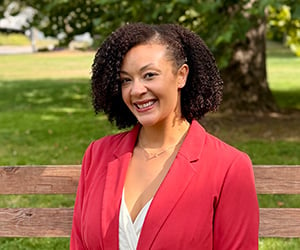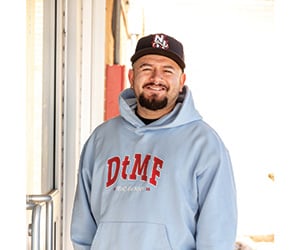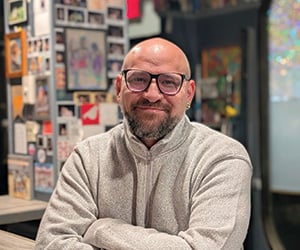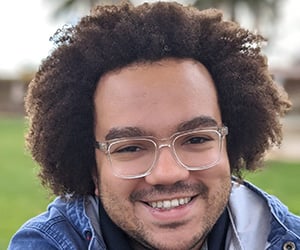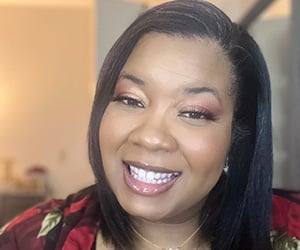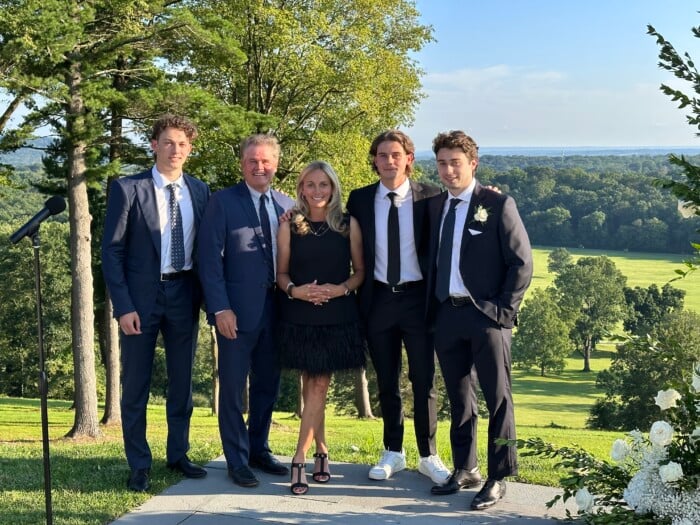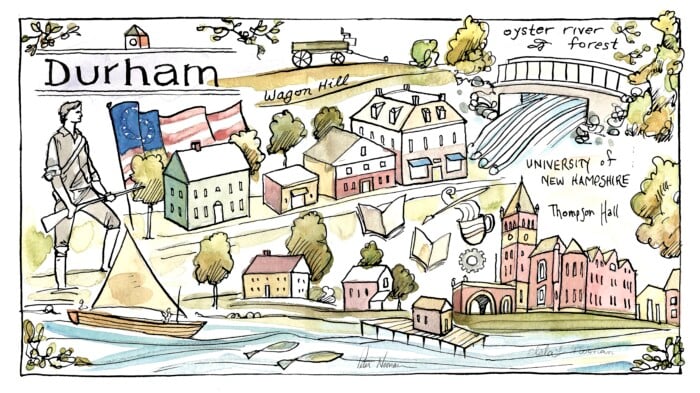Portsmouth’s Poet Laureate Diannely Antigua
Transforming a painful past into a poetic refuge of healing and understanding
 Diannely Antigua sits by a window at a table at the Book & Bar in downtown Portsmouth surrounded by notes for lesson planning in the University of New Hampshire’s MFA writing program, where she is the inaugural Nossrat Yassini Poet in Residence.
Diannely Antigua sits by a window at a table at the Book & Bar in downtown Portsmouth surrounded by notes for lesson planning in the University of New Hampshire’s MFA writing program, where she is the inaugural Nossrat Yassini Poet in Residence.
The poised young woman is Portsmouth’s 13th Poet Laureate. Her voice is steady and impassioned as she talks about her traumatic past — quite hopeless at times.
Ironically, an unexpected and fierce thunderstorm tore through Portsmouth while interviewing Antigua. According to Atlas Mythica, storms are symbols of creation, destruction and renewal. In art and literature, storms represent personal trauma and pain.
Antigua is a Dominican American poet and educator, born and raised in Massachusetts. She currently resides in Portsmouth.
Her debut collection, “Ugly Music”
(YesYes Books, 2019), was the winner of the Pamet River Prize and a 2020 Whiting Award.
“The poems in this first published collection are paradoxical,” Antigua says. “Even in the darkest times, there’s music.”
As a survivor, Antigua said it’s important to share her story and potentially reach others and provide support.
When Antigua was 3, her mother fled her abusive husband, and took Antigua and her siblings from shelter to shelter all across New England, even as far as Connecticut. She still recalls celebrating Christmas in a shelter that year, even at such a young age.
“The person who helped us get away from my father became my stepfather, and he was just as bad, if not worse,” she recalls. “He and my mother married when I was 7, and he was in and out of my house until I was 18.”
The family moved to Haverhill, Mass., and another layer to this story is that they began going to a Pentecostal church when Antigua was 9.
“It was very strict, and there was more abuse to come,” she says. “It was very isolating and cult-like. That’s what abusers do — they isolate you from other people. We were told the outside world was going to chew us up.”
Antigua said her stepfather found a church business card at a payphone, and they started attending that Sunday.
“So, I have this trinity of abusive father figures,” she says. “Writing came to be so important to me. It gave me a refuge. I wanted to see a therapist when I was 16, but my family said, ‘No, the church was against it,’ and as for medication, ‘absolutely not.’”
Antigua began journaling when she was 9 after her oldest sister gave her a journal. From there, she started to explore poetry and fiction.
“I was 22 when I (finally) got the help I needed,” she says. “I was done with undergrad (University of Massachusetts Lowell) and didn’t even have school to keep me grounded. I was a really good student, and that was the stability in my life.”
During the three years after she graduated, Antigua was in and out of hospitals seeking treatment for multiple suicide attempts and episodes of self-harm.
“I tried to figure myself out, digging through all the trauma,” she said.
In 2015, Antigua began her MFA degree at New York University, spending a semester in Florence, Italy, in the fall of 2017.
“At that point, my book, ‘Ugly Music,’ was picked up by YesYes Books,” she says. “I had just gone through at breakup and wrote 25 ‘Sad Girl Sonnets,’ over the three months in Florence. Some of them will be in my next book, ‘Good Monster,’ which is being published by Copper Canyon Press, due to come out in 2024.”
Antigua says her second book is also paradoxical.
“The monster was born when I was born,” she says. “It’s part of me and a culmination of anxiety and depression. There is this need that’s been unmet for a very long time.”
She became the Portsmouth Poet Laureate in May 2022 and is the youngest person and first person of color to receive this recognition.
“It’s difficult being the first of anything or being different, and it’s felt like a lot of responsibility to make changes to shake things up,” Antigua says.
“Part of my work as Poet Laureate of Portsmouth is to do just that: bring poetry to the people, regardless of race, gender, sexuality, disability, education or socioeconomic status,” she says.
“Too often poetry is categorized as an art form in which only the elite or the highly educated can access and decode. My goal is to demystify poetry, making it truly accessible to all in a way that nourishes the soul,” Antigua says.
In 2023, Antigua was awarded an Academy of American Poets Laureate Fellowship to launch The Bread & Poetry Project. As outlined on her website, The Bread & Poetry Project is a three-part approach harnessing this belief: Poetry, like bread, is essential and has the power to heal and actualize social reform.
This project will seek to uplift the Portsmouth Poet Laureate Program as it continues to build community through poetry; the Bread & Poetry Podcast with its goal to make poetry accessible to all through meaningful conversations that demystify poetry and provide listeners with tools and resources; and local organizations such as, but not limited to, HAVEN, that supports victims of domestic violence and sexual abuse, as well as NH PANTHER with their mission to end racism and systemic biases.
“Poems have brought me to all the right rooms where I have met the people who have empowered me to continue,” Antigua says. “Bread sustains life, and I believe poetry has the power to do the same.”
(Editor’s note: To read more about Diannely Antigua, visit www.diannelyantigua.com.)
This article is featured in the winter 2023 issue of 603 Diversity.
603 Diversity’s mission is to educate readers of all backgrounds about the exciting accomplishments and cultural contributions of the state’s diverse communities, as well as the challenges faced and support needed by those communities to continue to grow and thrive in the Granite State.

